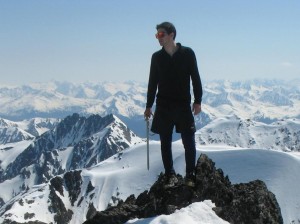Podcast: Play in new window | Download
Subscribe: Apple Podcasts | RSS
 We talk with civil engineer, author, and coach Anthony Fasano about steps one can take to ensure a successful engineering career.
We talk with civil engineer, author, and coach Anthony Fasano about steps one can take to ensure a successful engineering career.
- Although Jeff’s engineering career hasn’t led to huge financial success, he considers it to have been successful, as he has gotten to work on a lot of interesting projects, and meet many fascinating people.
- Our guest for this episode is Anthony Fasano, a professional engineer who has authored the book, Engineer Your Own Success: 7 Key Elements to Creating An Extraordinary Engineering Career.
- Anthony started as a field surveyor in high school, which led him into a career as a civil engineer.
- Coming out of college, our guest focused his professional efforts in the area of site development while working for Maser Consulting.
- Young engineers are often not aware of the numerous sub-disciplines that comprise the engineering profession.
- Sensing that his work routine was falling into a rut after a few years on the job, Anthony started asking other engineers what it took to develop a successful engineering career.
- Having leveraged non-technical skills en route to becoming an associate partner, Anthony was asked by his employer to share his insights with other engineers.
- Our guest credits Tony Robbins with influencing his decision to become an executive coach.
- Having been successful in coaching engineers at Maser, Anthony left to start his own firm, Powerful Purpose Associates.
- Seeing that his “true” clients were engineers, rather than engineering companies, our guest started the Institute for Engineering Career Development.
- After writing his book, Anthony spent three years touring the United States, with books in the trunk of his car, talking to engineering associations about achieving career success.
- From Anthony’s book, the seven keys to achieving success in an engineering career are:
- Setting Goals
- Obtaining Credentials
- Finding a mentor
- Becoming a great communicator
- Networking
- Becoming organized
- Being a leader
- Our guest recommends getting involved with an organization like Toastmasters International to improve speaking skills.
- Anthony credits Dale Carnegie’s book, How to Win Friends and Influence People, with improving his understanding of how to interact with other people.
- Dealing with e-mail overload is a subject Anthony addressed on his blog, in an entry titled “Engineers: Are You Having Trouble Getting Out of Your E-mail Inbox?“
- A quick mention of productivity methods arises, including The Seven Habits, and Getting Things Done (GTD). Anthony recommends the book, The Power of Less, authored by Leo Babauta, for its simplification of GTD concepts.
- Anthony currently serves as Executive Director for the New York State Society of Professional Engineers.
- Anthony has written a number of articles about career development on his blog for the Institute of Engineering Career Development.
- A recent project for Anthony has been launching a podcast, The Engineering Career Coach, in which he advises engineers on how to advance their careers.
- Our guest can be found online via LinkedIn, Twitter, Facebook, and YouTube.
Thanks to Paxson Woelber for the untitled photo. Podcast theme music provided by Paul Stevenson
